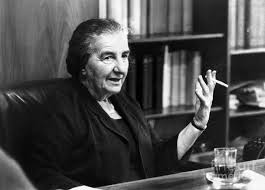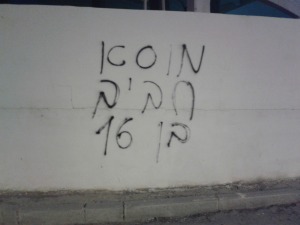Many, many friends of mine have been posting on Facebook recently about the conflict in Israel-Palestine, the bombs falling on Gaza and the rockets falling on Israel, and other aspects of the situation, including recent violent attacks on left-wing protesters in Israeli cities. These posts tend to fall all over the political spectrum: some of them resolutely defend Israel, some of them express sympathy with Gazans and Palestinians more generally, some of them are critical of both Israel and the Palestinians, some of them are critical of only one side or the other. I don’t agree with them all, although I am often curious to read even those opinions and ideas that I am inclined to automatically reject. Generally, I don’t comment unless I feel I can add something to the conversation and the conversation is respectful and thoughtful (this automatically disqualifies many posts, sadly).
Yesterday, a quote attributed to Golda Meir (which as far as I can tell is legit) popped up several times in my news feed. Printed against the backdrop of a photo of Meir speaking, the quote read, “We can forgive the Arabs for killing our children. We cannot forgive them for forcing us to kill their children. We will only have peace with the Arabs when they love their children more than they hate us.” This quote raised my hackles in a way that nothing else has, and after starting a conversation about the appropriate response to racist and hateful posts, I was inspired to comment (more on what those comments were in a moment). But it also occurred to me that this quote, and my response to it, is at the center of recent events, far flung and mostly unrelated, that have created a sick knot in my stomach over the last week: the crisis in Israel-Palestine, the downing of a Malaysian passenger plane, the botched execution of an Arizona man, and the horrifying murder of my college classmate Dan Markel. I had an anxious sense that all these things were related, but until I thought deeply about the Meir quote, I didn’t know why.
If we look more closely at Meir’s claim, we can see that it depends on the assumption of a faceless group called “the Arabs,” who act and feel as one monolithic entity. This monolithic entity, she claims, loves its children less than it hates Israeli Jews. If it is an inherent quality of human beings that we love our children unconditionally and above all, then to love one’s children less than one hates someone else is necessarily to be somewhat less than fully human. Of course, as with any essentializing claim about humanity, it doesn’t stand up to close scrutiny. If even one Arab loves his children above all, then Meir is wrong.
But proving this claim wrong is not enough; we have to understand why it is so dangerous. Examining its insidious mechanism reveals the way that generalizing, monolithic claims about religious, ethnic, and national groups dehumanize individuals and enable both the kind of mass killing we see now every day in the news – in Gaza, in Ukraine, in Sudan and elsewhere – and the kind of personal violence that killed Dan. Statements like these dehumanize whole groups of people, reducing them to nameless, faceless Others who are not like us, whose actions are the cause of our suffering (and their own), whose deaths are incidental to the larger human drama of which they are not a part.
I am thinking here not only of the Golda Meir quote, but also of the pro-Russian rebel commander who, when asked why a civilian plane would be flying over Ukraine, allegedly answered, “It means they wanted to bring some spies to us. Fuck them. They should not fly, we are at war here.” The people on the plane were not vacationers, scientists, children – they were spies. Spies who don’t belong, who, by flying inadvertently into a war zone, brought their deaths upon themselves. I am thinking of a professor friend who told me of an Iraq war vet in one of his classes who explained that the only way to kill someone is to convince yourself you are not killing a person, by persuading yourself through racism or other forms of magical thinking that your target is not human, but less than. I am thinking about the heinous murderer Joseph Wood, who was left gasping on a gurney for nearly two hours as the state of Arizona experimented with a new combination of lethal drugs for execution, and his victim’s brother-in-law, Richard Brown, who asked, “Why didn’t we give him Drano?” Without in any way minimizing Wood’s crimes or the suffering he caused, his prolonged execution and the subsequent suggestion that his death should have been horrible smacks of the kind of human experimentation that has only been carried out by the most abhorrent regimes in history against those deemed unworthy of life. I am thinking about the person who put a gun to Dan’s head, who in order to pull the trigger must have thought that his own grievances superseded Dan’s very humanity, his right to continue to live on this earth as a father, a son, a friend. I am thinking about Dan himself, whose field of study was retributive justice, a form of punishment that repudiates vengeance, and whose opposition to the death penalty was well known.
This is why I think it’s so important, right now, to fight the twin reactions of despair and silence. We have to speak out when we see dehumanization occurring, in speech or in deeds, point to it, disarm it with more speech, with dialogue, conversation, and respect. And we have to hope that our words will have some small effect, even if only to strengthen our own commitment to humanity and to humanism. We must remember the names of the victims of violence regardless of whether we feel the violence against them was justified, as in war, or not. We must commemorate and analyze and create beauty from destruction. We should mourn and rebuild what was destroyed when we can, strengthen community and human ties, move forward and go on. The Israeli journalist Haggai Matar posted a reflection yesterday titled, “A Few Optimistic Thoughts in a Nearly Empty Airport.” (Sorry, it’s only available in Hebrew.) He wrote, “Despite the despair and pessimism all around, I stubbornly believe that there is still hope here….I know there are those who will say that this is naïve, but it’s not.” It may be naïve, actually, but if it is I will accept this naïveté as the price I pay for a world in which we never stop fighting for an end to violence.




as always, you’re the smartest lady. I’m not usually strong enough to speak up when I believe the person won’t listen to me anyway because it always leaves me feeling so much worse, but maybe I should try more.
Just as there only needs to be one Arab to disprove Golda Meir’s quote, there only needs to be handful of extremists on either side to perpetuate the violence, even if the vast majority of people on either side of a conflict only seek peace. Unfortunately, there are some very wealthy players the Middle East that want the conflict between Israel and the Palestinians to continue, including Syria, who supplied many rockets to Hamas in the past, and continues to arm insurgents in Iraq, while simultaneously killing their own citizens. Yet Syria’s role in this conflict is being minimized in the media.
These powers want to destabilize the entire region, and they don’t care who gets killed, be it Palestinian civilians, Iraqis, or even their own citizens. When our own country has created mass murders such as Timothy McVeigh, who had the same upbringing, religion, and freedoms of those that he killed in Oklahoma, we face an uphill battle stopping more inspired angry young men in Palestine who are being supplied tens of thousands of rockets to rain down on Israel. Unfortunately they, and those that supplied the rockets, don’t care if innocent civilians get killed when their munition stores get blown up by Israel, any more than McVeigh was worried about killing children who were in the day care center at the federal building. I know that if McVeigh, or the shooters in Columbine, or the lone gunman in Aurora, had the same rockets that Hamas had, they wouldn’t have hesitated to fire them.
It would be easier for the peace loving Palestinians (and those who advocate peace in other countries, including the Ukraine) to bring the more fractious among themselves into the fold if these angry young men (and that is the majority of the fighters) didn’t have such a large stores of automatic weapons, grenade launchers, rockets, and in the case of the rebels in Ukraine, very effective anti-aircraft missiles, which allow them to bully all those around them. I’ve heard reports that Palestinians are blaming Hamas as much as they are Israel, because they know that their neighbors were storing missiles in their garage, but what could they do to stop them?
Until we manage to stop the vast proliferation of very powerful weapons from getting into the hands of these angry young men, nothing that Israel, the Ukraine, or the UN can do will stop the violence. Look how long the conflict in Northern Ireland took to bring to a stop, and in that case, the fighters shared a common country and a common language.